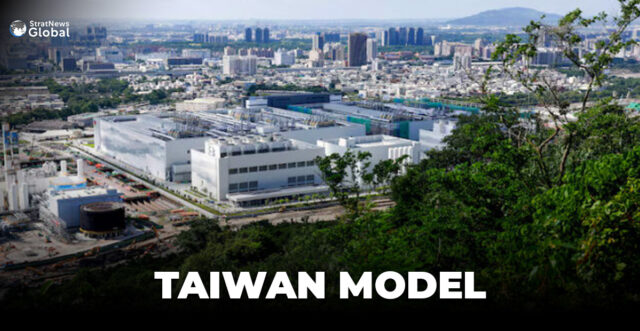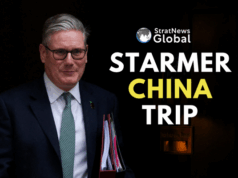Taiwan is exploring the possibility of a high-tech strategic partnership with the US, which is keen on boosting Taiwanese investment, the island’s chief tariff negotiator said on Thursday, providing an update on ongoing discussions with Washington.
Taiwan, home to the world’s biggest contract chipmaker TSMC, runs a large trade surplus with the United States. The island’s exports to the US are currently subject to a 20% tariff, a figure Taipei’s government is seeking to cut.
‘Taiwan Model’
Taiwan Vice Premier Cheng Li-chiun, who is leading the tariff talks with Washington, told reporters in Taipei she was hopeful both sides could reach a consensus on expanding investment in the United States through a “Taiwan model”.
This would not involve relocating supply chains but rather extending and expanding US production capacity, said Cheng, who returned this week from the latest round of talks.
The government views the model for investing in the country as “industrial investment planning” coupled with government support measures such as export credit guarantees and joint Taiwan-US development of industrial clusters, she added.
“The current negotiation focus is that the United States expects us to expand investments and engage in supply chain cooperation,” Cheng said.
Neither the US Commerce Department nor the Office of the United States Trade Representative has responded to requests for comment on the talks.
The US government went into shutdown on Wednesday.
TSMC, whose business is surging on strong demand for artificial intelligence applications, is investing $165 billion to build chip factories in the US state of Arizona, though the bulk of its production will remain in Taiwan.
No Plan To Shift Base
Cheng, who said TSMC did not take part in the latest talks, repeated that a proposal floated in US media by Secretary of Commerce Howard Lutnick for a 50-50 split in making chips is not something Taiwan would agree to and was not brought up.
“We can clearly say that we understand that the US side’s hope is to increase domestic production capability to satisfy US domestic demand,” she added.
The aim of Taiwan’s industry is to “remain rooted in Taiwan and deploy around the world, and then have bilateral strategic cooperation,” Cheng said.
(With inputs from Reuters)





